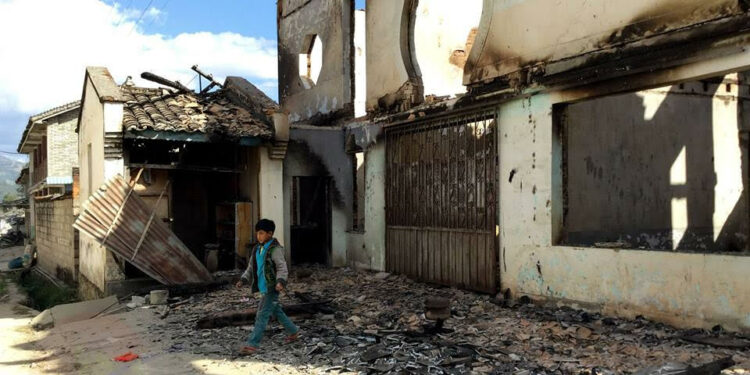Civil society organizations urged the National League for Democracy (NLD) led government to halt Burma Army offensives that have displaced civilians in Kachin and northern Shan states, and accused the international community of neglecting the situation.
“The Tatmadaw continues to pursue different policies in the northeast of the country, furthering displacement and the suffering of local communities,” said a statement signed by 180 leaders of civil society and faith organizations in Burma released on Wednesday.
“This is not what the people desired or expected when the National League for Democracy was voted into office by popular mandate last year.”
Armed conflict between the Burma Army and ethnic armed groups—including the Kachin Independence Army (KIA) and the Ta’ang National Liberation Army (TNLA)—has flared for months, and has intensified since Daw Aung San Suu Kyi’s Union Peace Conference in late August, killing dozens and displacing thousands.
“Restrictions to transport and rice and other basic foods are the worst,” said national director of the Rangoon-based Justice and Peace Commission Father Thomas Htang Shan Mong, adding that UN agencies have been restricted in providing aid to affected areas since late 2014.
“We expect the government to respond to our demands [to help the locals], and [these] should not be ignored,” added Father Thomas.
Government forces frequently shelled areas near camps for internally displaced persons (IDPs) in Kachin State’s Laiza as part of an offensive that overran KIA mountaintop Gideon outpost and nearby outposts in Waingmaw Township this weekend. Four Burma Air Force fighter jets also bombed a KIA outpost at Lai Hpawng on Wednesday morning. KIA sources on the front line said the attack on Lai Hpawng has intensified since Burma Army troops seized the strategic Gideon hill post.
Recently uprooted IDPs have been added to a number of civilians who already fled their homes in 2011—when a 17 year ceasefire between KIA and Burma Army fell apart—creating a “mass movement” of displaced persons, according to coordinator of the Kachin Peace Network Khon Ja. IDPs have no place left to run, she added.
Critics say that Burma’s Tatmadaw is committed to conquering armed ethnic groups in Kachin and Shan states under the auspices of promoting safety and stability.
Last month the Northern Alliance—comprising the KIA, TNLA, the ethnic Kokang Myanmar National Democratic Alliance Army and the Arakan Army—attacked government forces in northern Shan State to draw national and international attention to Burma Army offensives against ethnic armed groups.
“Our people have suffered a lot from the conflict, we want the NLD government to end civil war peacefully and try to solve the problems at the national political dialogue,” said Khon Ja.
The activist speculated that the NLD is keeping quiet on the military’s blockade of transport and aid in conflict areas due to agreements reached between the party and the military prior to the 2015 elections.
The security situation is poor and access for humanitarian aid and journalists is restricted in the conflict areas, making it harder for local residents to speak out against human rights violations, she added.
On Tuesday residents evacuated at least two ethnic Kachin villages in Kutkai Township of northern Shan State, according to Khon Ja.
“Last month, bombs fell on downtown Kutkai and there were reports of deaths. When our research team visited victims they dared not to speak to us as there is no guarantee of their safety,” explained Khon Ja.
Civil society organizations also encouraged the international community to pressure the Burmese government to allow relief access to communities in northeast Burma in order to achieve “inclusive” peace.
The collective statement decries international “neglect” of a deteriorating situation in northeast Burma and failure to “understand the political crisis in our country.”
“International communities have their own policies and currently their agenda is only filled with providing humanitarian support to the Rohingya in northern Arakan State,” said Khon Ja, highlighting that international aid organizations and media have been preoccupied with demanding access to northern Arakan State.
















